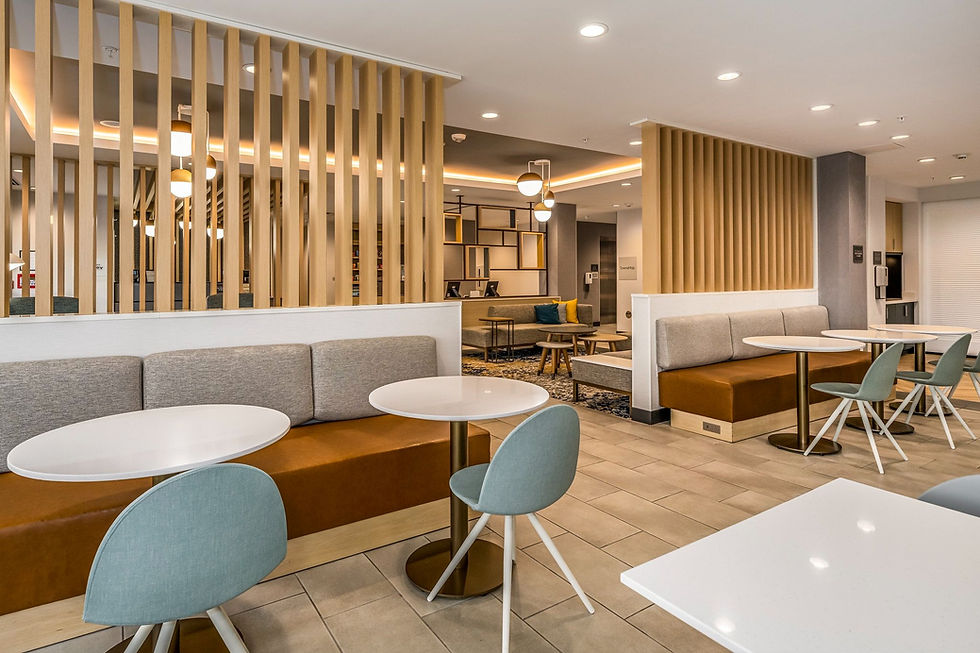Modular and Multifunctional Furnishings: The Future of Hospitality Design
- Sara Hospitality USA

- Jul 31, 2025
- 2 min read

In the ever-evolving world of hospitality, adaptability and innovation are not just trends—they are necessities. As hotels, resorts, and boutique stays continue to redefine the guest experience, one design element stands out for its practical brilliance and aesthetic appeal: modular and multifunctional furnishings.
Looking for quality hospitality furniture? Browse our stylish options today and elevate your space with comfort and elegance.
What Are Modular and Multifunctional Furnishings?
Modular furnishings are furniture systems composed of interchangeable components that can be easily assembled, disassembled, or rearranged to suit different spatial needs. Multifunctional furnishings go a step further by combining multiple uses within a single piece—think sofa-beds, storage ottomans, or desks that convert into dining tables.
When these two concepts converge, they create a dynamic, guest-centric design approach that adapts to changing demands without sacrificing comfort or style.
Why They Matter in Hospitality
With the rise of flexible travel patterns, co-working culture, and compact urban living, hospitality spaces must work harder and smarter. Here's why modular and multifunctional furnishings are gaining traction:
1. Space Optimization
Modern travelers expect rooms that feel spacious, even when square footage is limited. Multifunctional pieces like fold-out beds or nesting tables maximize floor space while maintaining a clean, sophisticated aesthetic.
2. Enhanced Guest Experience
Furniture that adapts to guest needs—whether it's a desk that becomes a vanity or a sectional that rearranges for group lounging—offers a personalized experience. It empowers guests to create their own version of comfort.
3. Operational Efficiency
Modular designs are easier to transport, replace, or reconfigure, reducing costs and downtime. This flexibility is especially beneficial for boutique hotels, pop-up stays, and extended-stay properties.
4. Sustainability and Longevity
Instead of replacing entire furniture units, hoteliers can simply update or reconfigure components. This approach supports circular design principles, reduces waste, and aligns with growing sustainability goals.
Design Examples and Applications
Convertible Desks and Dining Tables: Ideal for extended stays or hybrid leisure/business travel, allowing seamless transitions between work and relaxation.
Wall-Mounted Murphy Beds: Perfect for small urban hotel rooms, freeing up space when not in use.
Modular Lounge Systems: Sectionals or seating that can be rearranged for solo relaxation or group gatherings in lobbies or suites.
Storage-Integrated Furniture: Beds with drawers, ottomans with hidden compartments, and benches with lift-up lids reduce clutter and improve organization.
Future Outlook
As the hospitality sector continues to embrace hybrid models and tech-driven personalization, modular and multifunctional furnishings will become even more essential. Expect to see:
Smart furniture that integrates charging ports, lighting, or adjustable settings.
AI-informed layouts that use data to suggest optimal furniture configurations.
Sustainable materials designed for longevity and recyclability.
Final Thoughts
In a landscape where flexibility, efficiency, and personalization reign supreme, modular and multifunctional furnishings are not just a smart design choice—they're a strategic investment. By embracing this approach, hoteliers can offer guests a seamless, elevated, and memorable stay experience.
Whether you're designing a luxury resort or a micro-hotel in the heart of the city, the future of hospitality is flexible, and it starts with furniture that does more than just look good.



Comments